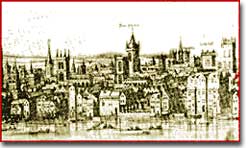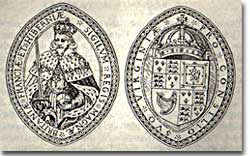2b. Joint-Stock Companies

As the city of London filled to capacity in 1600, Richard Hakluyt suggested to Queen Elizabeth that settlements in the New World might relieve the city of some of its poorer folks.
Compared with other European nations in 1600, England was relatively poor.
As new agricultural techniques made fewer farmers necessary, the poor multiplied in the streets of cities such as London and Bristol. Much to the dismay of the wealthier classes, the impoverished were an increasingly burdensome presence and problem.
A Pain to Spain
Richard Hakluyt, a 16th-century geographer interested in explorers and travel narratives, suggested to Queen Elizabeth that New World colonies could serve two purposes. First, they could challenge Spanish domination of the New World. Second, the ever-growing poorer classes could be transported there, easing England's population pressures.|
REASONS OR MOTIVES for the raising of a public stock to be employed for the peopling and discovering of such countries as may be found most convenient for the supply of those defects which this Realm of England most requires [the following]: 8. Where colonies are founded for a public-weal, they may continue in better obedience and become more industrious than where private men are absolute backers of a voyage. Men of better behavior and quality will engage themselves in a public service, which carries more reputation with it, than a private, which is for the most part ignominious in the end, because it is presumed to aim at a profit and is subject to rivalry, fraud, and envy, and when it is at the greatest height of fortune can hardly be tolerated because of the jealousy of the state. – Richard Hakluyt, "Reasons for Raising a Fund to Settle America On the Value of Colonies to England" (January 5, 1607) | ||
But Elizabeth was not persuaded to invest the public treasury in a venture that was likely to fail. She was not opposed to private investors taking such a chance, however. Raleigh had tried and failed. When it became clear that the wealth of an individual was not enough, the joint-stock company arose.
Joint-Stock Company
The joint-stock company was the forerunner of the modern corporation. In a joint-stock venture, stock was sold to high net-worth investors who provided capital and had limited risk. These companies had proven profitable in the past with trading ventures. The risk was small, and the returns were fairly quick.

Granted a charter by King James I in 1606, the Virginia Company was a joint-stock company created to establish settlements in the New World. This is a seal of the Virginia Company, which established the first English settlement in Jamestown, Virginia, in 1607.
But investing in a colony was an altogether different venture.
The risk was larger as the colony might fail. The startup costs were enormous and the returns might take years. Investors in such endeavors needed more than a small sense of adventure.
Expedition Investors, Leaders, and Laborers
Who led these English colonial expeditions? Often, these leaders were second sons from noble families. Under English law, only the first-born male could inherit property. As such, Sir Francis Drake, Sir Walter Raleigh, and Sir Humphrey Gilbert were all second sons with a thirst to find their own riches.
Merchants who dissented from the Church of England were also willing investors in New World colonies. There were plenty of Puritans who had the necessary capital, and with the Catholic-leaning Stuart monarchs assuming the throne the Puritans' motive to move became stronger.
With an excess landless population to serve as workers, and motivated, adventurous, or devout investors, the joint-stock company became the vehicle by which England finally settled the Western Hemisphere.
This starkly contrasted with Spanish and French settlements. New Spain and New France were developed by their kings. The English colonies were developed by their people. Many historians argue that the primary reason the relatively small and late English colonization effort ultimately outlasted its predecessors was because individuals had a true stake in its success.






